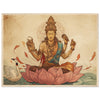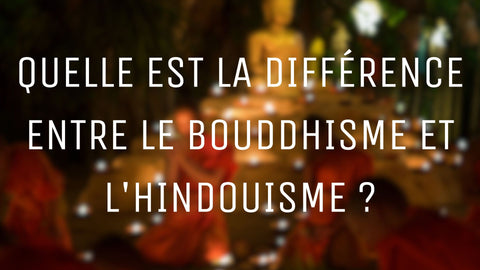
What is the name of the God of Buddhists
of reading
The gods in the eyes and multiple hands, richly trimmed and venerated, which are part of the Hindu and Buddhist pantheon, are in many temples and altars. The crops that venerate them offer an invaluable treasure of old knowledge. These names are always mentioned more frequently than most other gods and goddesses, including: Buddha, Tara, Quan Yin, Shri LAKSHMI, Ganesh, Hanuman, Shiva, Saraswati (Krishna), ... who are these mythical beings? Where do they come from ? And what is their teaching?
The Dhammapada is one of the most read books in Asia, and its message has been interpreted around the world. Divinities have emerged from these old and contemporary Asian religions that are Buddhism and Hinduism, with parallels that reveal the qualities of their divine counterparts as well as how they were used in everyday life by these religions. Some of these gods, although they have changed names and sex over time, have remained constant, printing their many personalities forever in our Akashic archives.
To read too: Do the Buddhists believe in God?

Shri lakshmi
The Goddess Lakshmi, which is undoubtedly part of most Hindu homes, is honored for one of his attributes: bring good fortune. It is not surprising that it has been called "the elected", particularly by women, since it is the wife and the dynamic equal of Vishnu, making it a very revered ultimate being. It is the Hindu goddess of wealth, luck and success, and it is venerated daily, especially during the month of October, which is designated as a "special month" for it.
LAKSHMI is the Hindu goddess of spiritual and material prosperity. She is represented in red and gold, holding coins or money in her hand, and we often find it on a bed of gold coins. LAKSHMI is also the Buddhist goddess of fortune and wealth, and we can see it on some of the oldest stupas and troglodyte temples in the world.
When one addresses a goddess or a god, to a holy person or a teacher, the sacred name lakshmi, which is said "shri", must always be used first. The term "shri" is used to characterize holiness and sacred while evoking beauty, wealth, prosperity and authority.

Tara
Tara, also known as the "Mother of Liberation", "Goddess of Compassion" and "The One That Saves" is one of the most popular Asian women's divinities. It comes from Hinduism and is considered a Bodhisattva woman, making it one of the "supreme beings" she helps us develop our qualities of compassion and emptiness.
There is a total of 22 tara invocations, each describing one of its characteristics. The White Tara is a pure, honest and innocent goddess that helps us overcome terrestrial challenges and dangers. Tara Verte is a fiery protector that helps us overcome obstacles and terrestrial perils.
In Sanskrit, Tara means "star" she is the omniscient star goddess. It is said that it has been generated from the sea and has features that look like word for Aphrodite. Tara teaches us work and success and how to get them. When we ask for advice, it gives us blessings of protection, purity and truth, as well as real compassion.
To read also: what are the beliefs of Buddhism

Ganesh
It is difficult not to notice the popular divinity with elephant head with the iconography that prevails in metaphysical supplies stores. Ganesh, commonly known as "the one who helps to overcome all obstacles", is a well-known and very important "figure", venerated throughout Nepal, Thailand, Sri Lanka, India and many other Asian countries. .
He is the God of the beginnings, invoked during rituals and ceremonies to start new experiences. Ganesha is the god of knowledge and intellect, as well as the protective divinity of the arts and sciences. When people enter the temples in India, Ganesha is usually the most recognized God, with visible sculptures in almost all cities.
Ganesha is characterized by his incredibly great ears, his belly rounded, his broken defense and his arms that carry objects in each of them. Huge ears are a representation of the ability of the wise to hear everything. The broken defense is represented because the Sage individual transcends duality. Ganesha is represented holding his broken defense with his trunk to write letters, as a divinity of writing and studies.
The lotus we see in the hands of Ganesha represents illumination or spiritual awakening. Aiguillon (Ankus), used to control elephants, symbolizes the soul that is diverted from the ignorance and illusions of this world. A "PASAM" (flowing node) serves as a weapon against vanity and disappointment. The reward for the application of wisdom in our life is represented by a pot of rice, a piece of meat or a candy.
One can frequently see Ganesha's hand with a sign that says "blessing of all humanity" the trunk of an elephant, which can also uproot a tree than pick up a needle, symbolizes a colossal power and a sharpened intelligence.

Quan yin
Quan Yin is a Buddhist divinity. In English, it is sometimes known as "Guanyin", "Kwan Yin" or simply "Kuan Yin" he was originally known as the God of compassion and watched the world with sadness. To save those who suffer, he swore to give his life for them. Quan Yin has become a female version in Chinese during the Tang Dynasty (618-907 ad), when he was renamed Quan Yin, and all the images of this bodhisattva are represented as women since then.
The thousand arms and an eye in every palm of Quan Yin's new form have been added to stop any pain in the world, as well as a thousand eyes to see anyone who suffers.
In Sanskrit, Quan Yin means "the one who hears the cries of the people" the goddess of compassion Quan Yin can be represented with a branch of willow to cure the disease, a vase of water to purify and nourish the spirit, or a Lotus flower to bring a spiritual awareness.
She is venerated for her compassion and endless love, because she helps people heal and recover, especially children, fishermen and those who give their lives to help others. Quan Yin uses feelings of empathy and unconditional affection. It is also called the mother of deceased children.



















